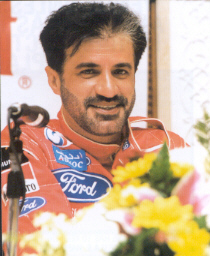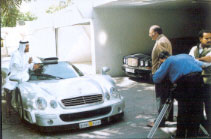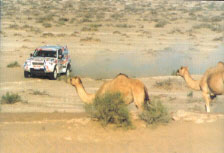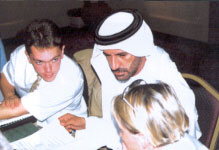|
The government of Bahrain has signed an agreement with the German consultant firm TILKE, one of the leaders in race track design, to go
ahead with the $100 million project."We want to ensure that Bahrain is identified with motor racing like many other countries in the world are identified with their own distinct sports activities,"
said Sheikh Fawaz bin Mohammed Al Khalifa, President of the General Organisation for Youth and Sports. The proposed facility will contain a three-circuit race track equipped to incorporate a grand prix,
inner and outer plus a drag track. The inner and outer track will combine to form the grand prix loop. The track length will be just over five kilometres, maximum uphill slope of 6.4 per cent, maximum
downhill slope of 6.2 per cent. The estimated time for a lap in a F1 car is 1.45:51 mins at an average speed of 196.73 kms per hour. Some of the other main highlights include a dedicated garage for an F1 Grand Prix located at the start and finish and opposite a main grandstand which can seat 16,000
spectators. There will also be buildings for each team along with administration and hospitality boxes, medical centre and broadcast centre designed to meet the strict F1 management standards.
A FORMULA ONE EVENT COULD REAP UPTO $ 200 MILLION DOLLARS PER YEAR |

|
" A new reason to smile " Mohammed Bin Sulayem |

|
Bin Sulayem Explaining the value of F1 in a TV interview |
| |
There will also be a VIP viewing area, press facilities for 500 journalists not to mention the dozens of food
and merchandise outlets. It's a mammoth project and extremely ambitious but the Bahrain government, which is underwriting the project, has put its money where its mouth is and could reap in
upwards of $200 million per year should they be successful in attracting a Formula One event. "A number of feasibility studies were undertaken during the past 18 months to ascertain the various aspects
on the project and only on the basis of these studies it was decided to go ahead with the project as it would help to promote Bahrain and bring immense
benefits to its people in many ways," said Sheikh Mohammed bin Isa Al Khalifa, President of the Court of Crown Prince of Bahrain.The track will be built in Sakhir, some 19 miles
southwest of the capital Manama and it is also expected that the facility will be used for go-kar ting and motorbike competitions. While the country goes through the long drawn out process of applying for
Formula One status, officials hope teams will take advantage of the track to try out their machines in hot weather testing. But simply building a track does not guarantee a Grand Prix, as China, Russia and
Venezuela have found out. The infrastructure needs to be sound off the track and this is where the pendulum could well swing back into the UAE's favour.
Bahrain currently does not have the hotel room capacity to host the travelling motor circus, but Dubai, on the other hand, has recently gone through a leisure growth boom, making it more than capable
of coping with the influx of thousands. A leading UK construction company is believed to be in the midst of finalising plans for a
multi-million dollar facility to be built in the UAE, with a patch of land on the Al Ain-Abu Dhabi road being widely touted as the prime spot. It goes without saying
that an F1 Grand Prix staged in the UAE would be the biggest thing to hit its shores since the discovery of oil but motor fans have seen their hopes dashed before. Back
in the late 80's and even into the early 90's, the Hyatt Regency area in Deira was earmarked as the place to build a track but we are into the new millennium and the
country is still no nearer to realising its dream.
Formula One motor racing took its biggest stride towards the region earlier this year following a high level meeting held by the sport's governing body.
Keen to increase its global appeal, the FIA discussed the possibility of reducing the number of Grand Prix races held in Europe in order to take
Formula One into fresh territory, and the Middle East is one of its black holes.
The current Formula One season consists of 17 events and the FIA is reluctant to increase an already overstretched season so the axe may fall on Europe's busy
calendar to the delight of a host of countries looking to muscle in on one of the world's most lucrative sports. As the momentum gathers and excitement mounts, the
FIA has warned the UAE not to get carried away.
" NO COUNTRY CAN BE CONSIDERED AS A GRAND PRIX HOST VENUE UNLESS IT ALREADY HAS THE INFRASTUCTURE IN PLACE "
|

|
Desert rallying has to keep the fans in the U.A.E. happy for the time being. |

|
Bin Sulayem in the FIA meeting held in Dubai last year |
| |
"No country can be considered as a Grand Prix host venue unless it already has the infrastructure in place," said an FIA spokesman
from its offices in Switzerland. "The UAE currently does not have a track so how can it be considered? Build a facility; apply for a Grand Prix, and then the process begins. "At this moment in
time, there are no slots available. In fact we have a reserve list of countries wishing to join including China, Venezuela, and Russia. They already have the facilities there and it is just a case of fine
tuning them." But one trump card the UAE could play is by utilising its biggest sporting star, rally driver Mohammed bin Sulayem, who is believed to be a key middle man between the decision makers
at the UAE ruling families and the powers that be at the FIA. "The money and exposure that a Grand Prix would bring to this country would be huge,"
said the 11-time Middle East Rally Champion. "I have always said that Formula One is the third biggest event you could bring to a city following the Olympic Games and the football World Cup.
There is nothing that compares to it and that is why it is so difficult to obtain an event."I am a huge believer that the original outlay of money would be money very well spent. True, it costs
many tens of millions to build a facility but that money can be recouped 10 times over in the long run. I would like to see a Formula One track used for a wide variety of motor racing events and not
just kept for the one race each year. It would be a tremendous boost to the economy here and a great way to develop the motor racing talent that we have within the region."
Bin Sulayem's enthusiasm for motor sport has not been diminished one bit following his near fatal smash on the Rally of Lebanon in late
June when he suffered first degree burns in a fire ball."I was lucky to get out of it but I can't wait to get back behind the wheel of a car again," he said. Bin Sulayem
has been a massive ambassador for the Middle East rallying scene in general and is believed to be working vigorously behind the scene in order to bring Formula One to
the region. The reality is that 2005 would be the earliest we could expect to see Michael Schumacher and co making a competitive visit to the region, but judging by
the excitement it has already caused, it could not come fast enough. |
